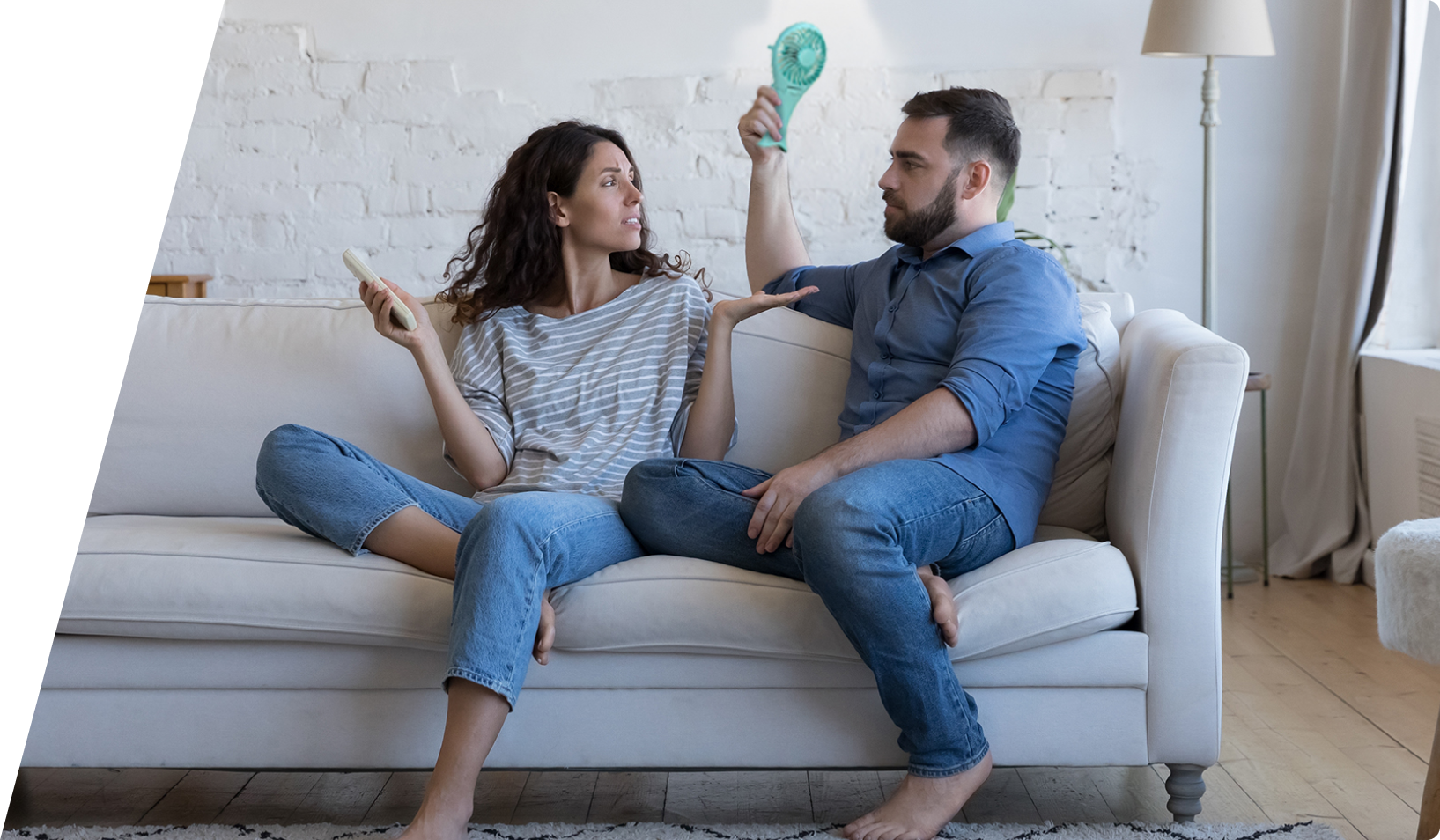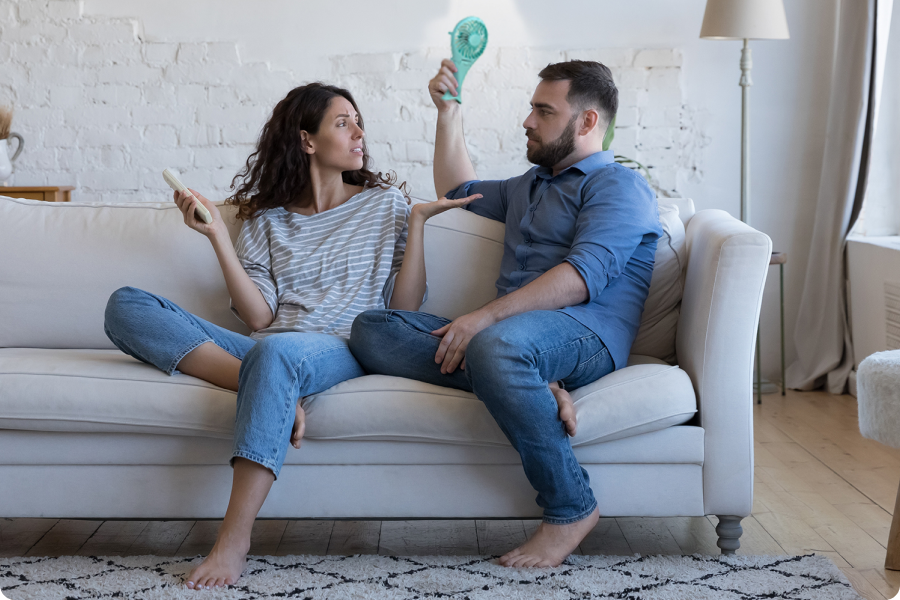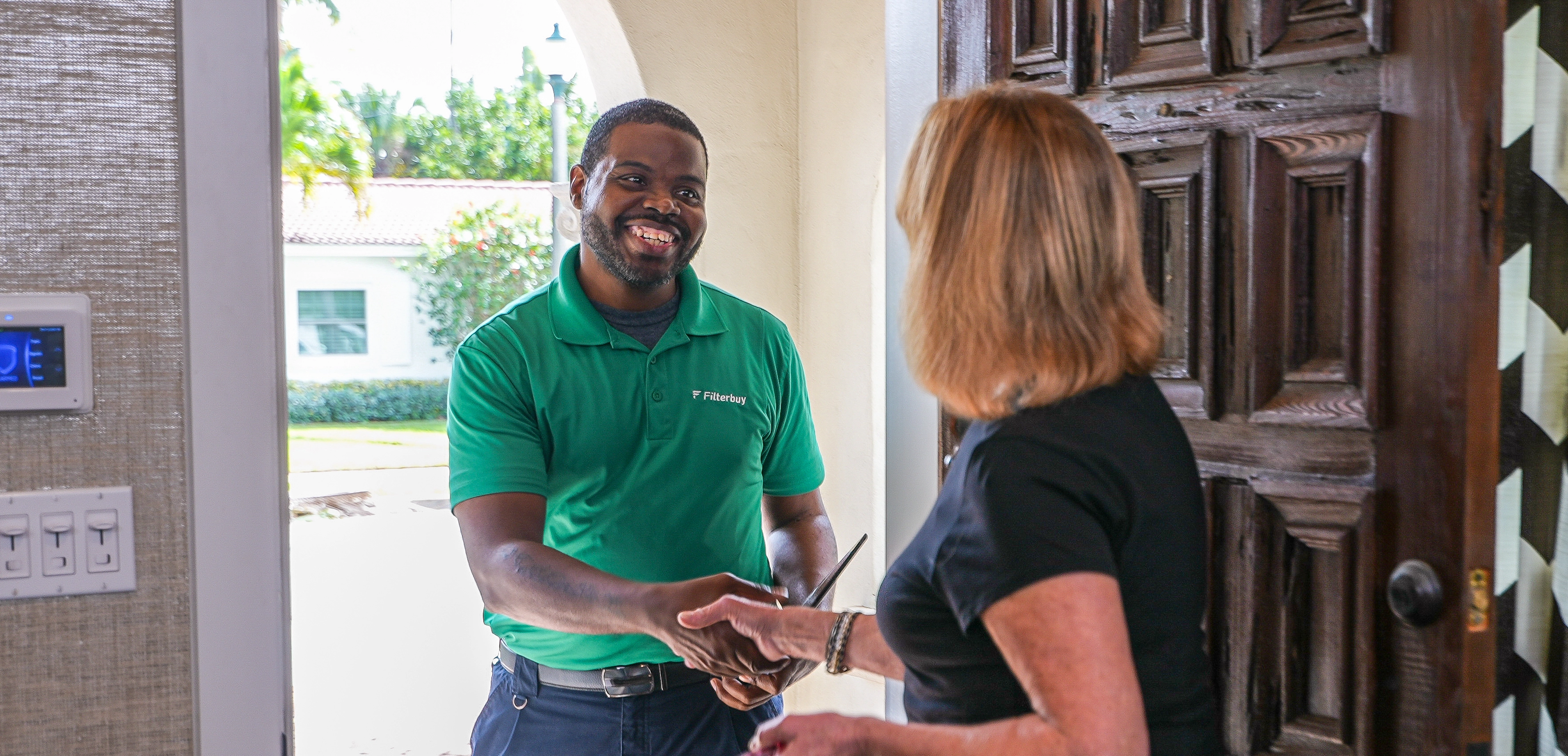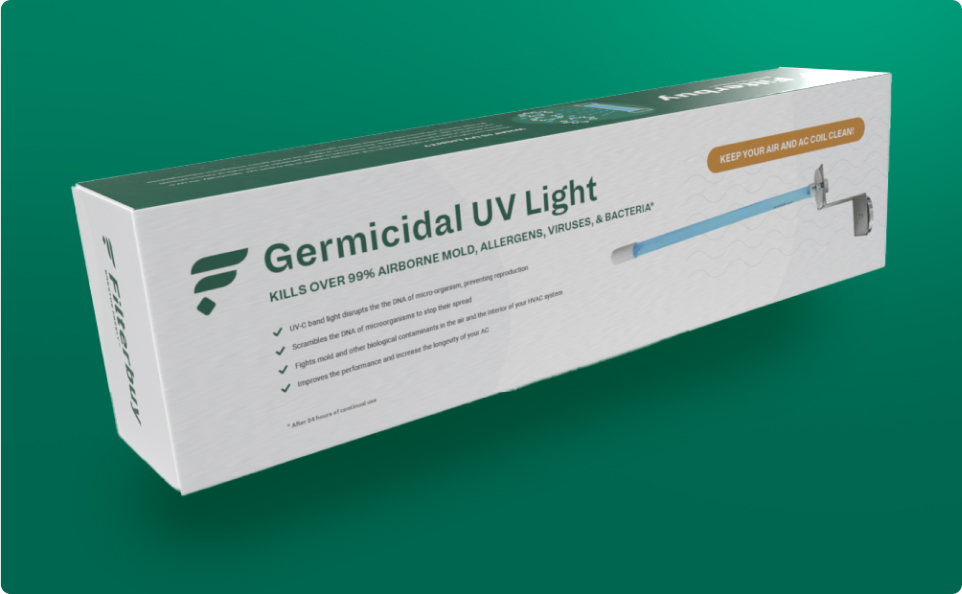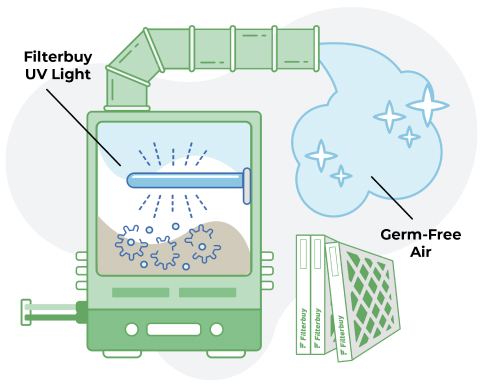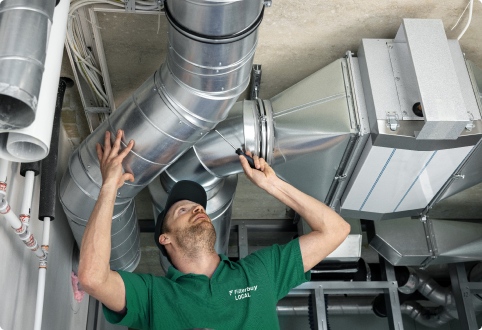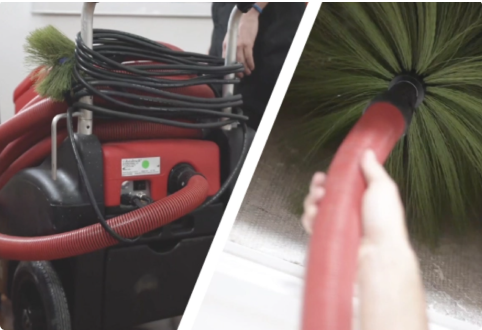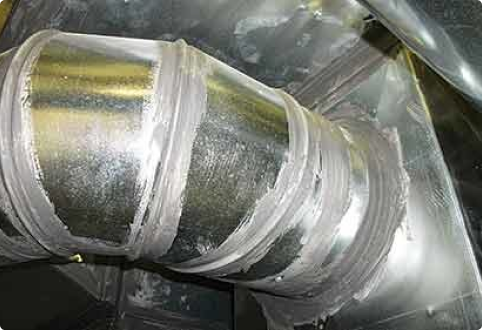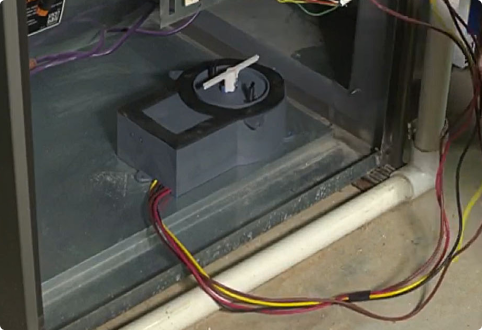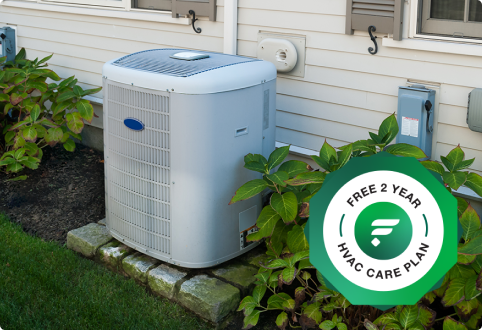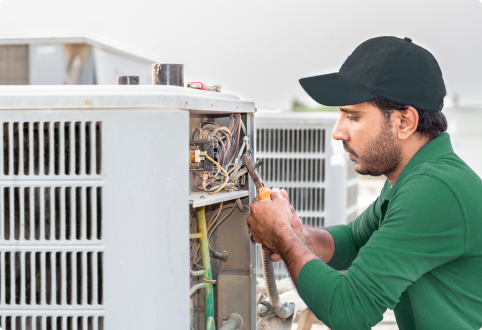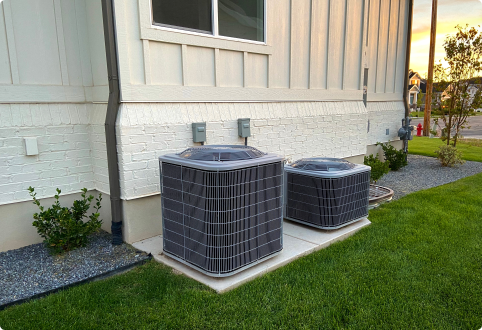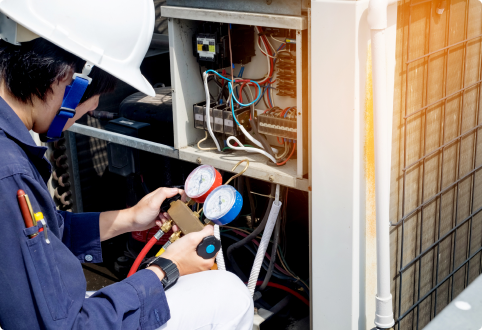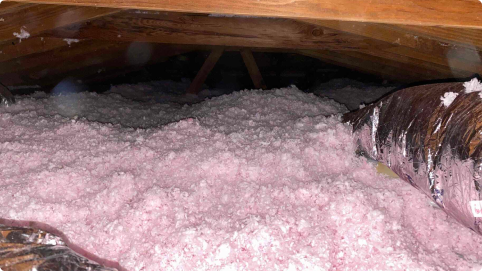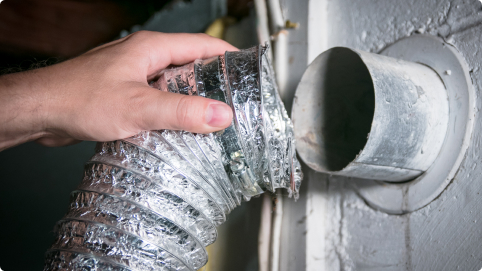Welcome to Filterbuy HVAC Solutions, the best HVAC UV light installation service company proudly serving in and near the greater West Palm Beach, FL area. Please let us know how we can help solve your West Palm Beach HVAC UV light installation needs with professional, affordable, and fast residential and commercial HVAC services by getting a free online quote or by giving our friendly HVAC specialists a call. We look forward to hearing from you!
HVAC UV Light Installation in West Palm Beach FL
The installation of HVAC UV light systems has become increasingly popular in West Palm Beach, Florida homes and office buildings. Your home and office space needs this HVAC system upgrade to optimize its power in enhancing indoor air quality.
HVAC UV lights have a range of applications and can be used to improve indoor air quality and reduce energy costs. These devices use ultraviolet radiation to kill germs, bacteria, mold spores, dust mites, microorganisms, and other contaminants that may be present in the air or on surfaces.
By purifying the air inside your home or office buildings, you benefit from improved health conditions such as reduced coughing and sneezing fits caused by allergies or asthma-related diseases.
Additionally, since less debris is entering your heating/cooling units they require less frequent maintenance resulting in lower repair bills.
The installation process of HVAC UV light systems is complex and should only be completed by experienced professionals with knowledge of local codes and regulations.
Moreover, additional steps must be taken to guarantee that no wiring mistakes occur during the setup procedure which could lead to short-circuiting or system malfunctions. To ensure everything is done correctly, you should seek certified experts who specialize in providing comprehensive HVAC UV light installation services tailored specifically for West Palm Beach, FL residences and commercial establishments.
Definition Of HVAC UV Light
HVAC UV light is a revolutionary technology that has revolutionized the air conditioning industry. It is an advanced ultraviolet (UV) lighting system installed in your HVAC system to reduce pollutants, allergens, and other airborne contaminants from circulating through your home or business.
This impressive innovation works by emitting strong UV-C radiation into your AC unit's airflow, breaking down any harmful particles it comes across. The result? Cleaner, healthier air for you and your family! With its ability to provide powerful protection against viruses and bacteria while also reducing energy bills, it's no wonder why so many people are turning towards installing this state-of-the-art solution in their HVAC systems.
Not only does it offer a wealth of benefits but it can be easily integrated with existing units too – making installation painless and simple.
Benefits Of Installing HVAC UV Light
Installing HVAC UV light systems can provide many benefits to property owners. These include improved indoor air quality, increased energy efficiency, and a decrease in the cost of maintenance. Understanding these advantages can help homeowners make an informed decision when deciding whether or not to install such a system.
The first benefit of installing HVAC UV lights is enhanced air quality. According to research conducted by the Environmental Protection Agency (EPA), ultraviolet radiation from this type of system has been proven to reduce bacteria, viruses, mold spores, and other airborne particles that contribute to poor air quality. This means that residents will be less likely to suffer from allergies and respiratory illnesses caused by pollutants in their home environment. Additionally, since most homes contain carpets and furniture made with synthetic materials that act as dust magnets, using UV light helps keep them clean and free of contaminants.
Another advantage of using HVAC UV lights is increased energy efficiency and savings on utility bills over time. The installation process requires little effort but provides major rewards for those who choose it due to its efficient use of electricity. By properly utilizing ultraviolet radiation, the amount of heat absorbed into the home during summer months can be drastically reduced; during winter months, warm air trapped within the walls gets released faster resulting in quicker heating times. With proper timing and usage patterns established through regular monitoring, property owners can save up to 30% on their monthly power costs compared to traditional methods of cooling or heating a home space.
Finally, one significant benefit associated with installing an HVAC UV light system is the decreased cost of ownership over time. Since this technology prevents the buildup of allergens indoors while also reducing common causes for repair needs like clogged filters or malfunctioning motors, purchasing such equipment upfront pays off in long-term savings on service calls alone. In addition, choosing high-quality bulbs makes sure they last longer than average models helping further propel ROI potentials upwards over several years' worth of use without having any additional expenses incurred along the way. This ensures fewer repairs are needed later down the line making overall maintenance costs minimal even if additional upkeep may become necessary at some point after the purchase date has passed due to normal wear-and-tear scenarios occurring naturally over time.
Types Of HVAC UV Light Systems
HVAC systems can be equipped with ultraviolet (UV) light technology to purify the air and improve indoor air quality. UV lights are available in different types, sizes, and wattages depending on the specific needs of a homeowner’s HVAC system.
The most common type of UV light is the germicidal lamp which eliminates harmful organisms such as mold spores, bacteria, fungi, and other airborne contaminants that may cause illnesses or allergies. This type of UV light typically has a wavelength between 200-280 nm and requires an enclosure for proper installation within the ductwork.
Another type of UV light used in residential HVAC applications is the photocatalytic oxidation (PCO) system which works by using catalysts to oxidize organic compounds into harmless carbon dioxide and water vapor molecules before they enter the home environment. PCO systems use longer wavelengths than germicidal lamps, usually around 254 nm.
Finally, some homeowners opt for hybrid models featuring both germicidal lamps and PCO systems to achieve even higher levels of air purity throughout their homes.
All three types of HVAC UV lights require professional installation to ensure optimal performance while avoiding any potential safety hazards associated with improper wiring or incorrect placement within the ductwork.
Installation Process
The installation process is an important factor to consider when installing HVAC UV light systems. The complexity of the system, as well as the environment in which it will be installed, should be taken into account before beginning. This includes having a professional technician assess the area and ensure that all components are functioning properly. It also involves following safety protocols and ensuring proper ventilation to prevent any buildup of harmful gasses or particulates.
When hiring a professional installer, they will typically provide detailed instructions on how to install the unit correctly. This information varies depending on the specific model being used but generally includes steps such as connecting electric lines and setting up fans for proper air circulation. Additionally, detailed diagrams may be included with some models so that users can visually confirm each step in the process before proceeding further. Professional installers can help identify potential problems during installation and offer advice about best practices for maintaining optimal performance over time.
Qualified technicians have expertise in both mechanical engineering principles and local building codes, allowing them to safely complete installations while remaining compliant with regulations. They can answer questions regarding energy efficiency ratings, product warranties, and repair options if needed. Ultimately, their knowledge ensures that homeowners receive quality service while avoiding costly mistakes due to improper setup or maintenance.
Advantages Of Professional Installation Services
Installing HVAC UV light systems is a complex process that requires the expertise of trained professionals. Professionally installed HVAC UV lights can improve energy efficiency, reduce energy costs, and create healthier indoor air quality. Additionally, professional installation services help ensure that these systems are set up correctly which helps them function optimally over their entire lifetime.
In terms of energy efficiency, professionally installed UV lights can improve how well an HVAC system works by trapping particles as small as 0.3 microns in size before they reach the AC unit’s fan blades or coils. This increases airflow and reduces the amount of time it takes for an HVAC system to cool down or heat a space while using less electricity than a non-UV model would require. Furthermore, since professional installers will make sure the ductwork is properly sealed with mastic tape, this further improves overall energy efficiency.
Professional installation services also provide peace of mind knowing that all components have been tested before use and any problems have been addressed during installation. Not only does this result in fewer repairs due to improper installations but also allows for better performance from the units throughout their lifespan. Moreover, installing ultraviolet lamps inside the return ductwork can drastically reduce mold growth and other airborne contaminants resulting in improved indoor air quality (IAQ).
The advantages of hiring professional installation services are clear: enhanced energy efficiency leading to lower utility bills; extended life expectancy for equipment; greater comfort levels; and improved IAQ, all at minimal cost when compared to DIY attempts. The next section looks at factors related to the cost associated with having HVAC UV light systems professionally installed.
Cost Factors
Installing a UV light system in an HVAC unit can be relatively costly, but there are several cost factors to consider when determining the overall cost. The four main factors that affect cost include labor costs, materials, safety considerations, and total project time.
1. Labor Costs: Depending on where you live and the size of your job, hiring professional installation services may add significant labor costs to your project. It is important to shop around for competitive rates while considering experience and quality of workmanship before selecting a contractor or service provider.
2. Materials: In addition to labor costs, the type of materials used will also have an impact on the final price tag. Quality materials typically last longer which could save money in the long run by reducing maintenance costs over time. However, higher-quality materials tend to be more expensive upfront than their lower-cost counterparts.
3. Safety Considerations: Installing a UV light system requires specialized knowledge because any mistakes could result in damage to both property and people’s health if not correctly installed. Ensuring proper installation is key to avoiding potential legal issues as well as financial losses due to repair/replacement from improper installation practices being employed during the process.
4. Total Project Time: The amount of time required for completion can also play a role in increasing or decreasing total project costs depending on whether overtime pay needs to be factored into the equation or not. Knowing how long it should take based on previous similar jobs will help determine what kind of rate you should agree upon with your chosen contractor or service provider upfront so that no surprises arise once work begins.
When considering all these cost factors before beginning any HVAC UV light installation project, homeowners can make sure they get the best value possible without sacrificing the quality of workmanship or compromising safety standards along the way.
Safety Considerations
When installing an HVAC UV light, safety considerations should always be taken into account. It is important to ensure that the power source used for installation has been properly protected from weather and other elements to avoid any potential electrical shock hazards. In addition, all wiring should be securely connected and watertight seals must be utilized where applicable. Additionally, when mounting the UV lamp it is important to use appropriate brackets or supports as required by the manufacturer’s instructions.
It is also necessary to take proper precautions when handling ultraviolet lamps due to their high-intensity output. The use of protective goggles or face shields is recommended while working with these devices to protect against eye injury caused by direct contact with the beams emitted from the device. Furthermore, gloves should also be worn during installation and maintenance procedures as they can help prevent burns or irritation resulting from incidental contact with hot surfaces associated with the operation of this equipment.
Finally, care should be taken not to overload circuits which could result in circuit damage or fire hazard. All local building codes and regulations about HVAC systems must additionally be followed closely throughout the installation process. These safety protocols will ensure that the system will function correctly and safely for many years ahead without risk of disruption or injury.
Maintenance And Repair Services
In addition to installation, HVAC UV light services also provide maintenance and repair. Ensuring the system is in proper working order is essential for the optimal performance of the unit.
Regularly scheduled preventive maintenance can detect any issues before they become major problems that may result in more costly repairs down the line. Maintenance packages typically include cleaning components, adjusting settings, replenishing filters, inspecting electrical connections, checking refrigerant levels, and confirming correct airflow.
In case of a malfunction or breakdown, experienced technicians can diagnose any issue quickly and efficiently with their necessary tools and resources. They will then determine if a repair or replacement is necessary based on the severity of the damage to ensure its longevity and prevent further complications from arising. It is important to keep up-to-date with local regulations when performing these types of tasks as certain practices may be prohibited by law due to safety reasons. With knowledge about current guidelines and industry standards combined with quality equipment and materials, customers can trust professionals at HVAC UV light services in West Palm Beach FL to deliver excellent results.
By following all procedures accordingly during maintenance and repair processes it allows them to stay within legal boundaries while ensuring top-level customer satisfaction. Local regulations must be followed closely when dealing with HVAC systems which makes understanding codes crucial for providing safe service operations.
Local Regulations
Installing an HVAC UV light can be complicated and expensive, as it is subject to a range of local regulations. According to the Environmental Protection Agency (EPA), over 2 million ultraviolet germicidal irradiation systems have been installed in America since 2015. These varying regulations can affect the installation process for both residential and commercial buildings.
In some areas, installing an HVAC UV light requires approval from local authorities such as fire departments or building inspectors. Likewise, certain codes may need to be met regarding the electrical components used during the installation process. Furthermore, depending on the type of system being implemented, additional permits may also be required which could lengthen how long it takes before completion.
For these reasons, proper knowledge of any applicable laws is essential when embarking on this sort of project. With a thorough understanding of all necessary paperwork and certifications that must be obtained beforehand, people can save time and money to make sure their installation goes off without a hitch.
Acquiring HVAC UV Light Installation Services In West Palm Beach FL
There are different ways to get HVAC UV light installation services in West Palm Beach, Florida. Some offer both residential and commercial installations while others specialize in one or the other. When selecting an installation company, it is important to consider several factors including:
1. Knowledge of local regulations
2. Quality of service
3. Cost-effectiveness
To ensure that all applicable codes are met, it is essential to select a qualified contractor who understands the specific requirements for this type of work in the area. It is also important to research their reputation and customer reviews to make sure they deliver quality service and stand behind their work with warranties or guarantees. Additionally, cost should be taken into consideration when making a decision on which company to use as prices can vary greatly from one provider to another.
Comparing different providers and researching customer reviews can help potential customers find an experienced professional at a price that fits within their budget range. Additionally, many contractors may have additional certifications such as LEED accreditation or certification by the North American Technician Excellence (NATE), indicating higher levels of training and expertise than what is required by law for basic inspections or installations. Taking these steps will help guarantee that the project is completed correctly and safely according to local building codes and standards.
Frequently Asked Questions
How Much Does It Cost to Install UV Light in HVAC Per?
Installing UV lights in HVAC systems typically costs between $500 to $2,000 per unit, depending on the type and size of the UV light system being installed. Factors that can influence the cost include the brand, quality, installation complexity, and any additional features or accessories required for the specific HVAC system.
Is It Worth Installing UV Light in the HVAC?
The decision on whether installing UV lights in your HVAC system is worth it depends on various factors. UV lights can help improve indoor air quality by reducing mold, bacteria, and viruses in the air and on surfaces. They can also enhance the efficiency and longevity of your HVAC system by keeping the coils and other components cleaner. However, the effectiveness of UV lights can vary, and the cost of installation should be weighed against the potential benefits for your specific needs.
Can I Install a UV Light in My HVAC System?
In most cases, you can install a UV light in your HVAC system. However, it is recommended to consult with a professional HVAC technician to assess your system and determine the best placement and type of UV light for optimal effectiveness. Proper installation is crucial to ensure the UV light works efficiently and does not cause any damage to the HVAC system.
What Is the Life Expectancy of a UV Light for HVAC?
The life expectancy of a UV light for HVAC systems typically ranges from 9,000 to 14,000 hours of continuous use, which is roughly about a year or two. Regular maintenance and replacement of the UV light bulb are necessary to ensure its effectiveness in controlling mold, bacteria, and other contaminants in the HVAC system.
What Is the Disadvantage of UV Light in HVAC?
One disadvantage of UV lights in HVAC systems is that they may not be effective in killing all types of contaminants, such as dust, allergens, and volatile organic compounds (VOCs). Additionally, UV lights can be costly to install and maintain, and improper installation or maintenance can lead to reduced effectiveness or even damage to the HVAC system.
Do HVAC UV Lights Use a Lot of Electricity?
HVAC UV lights are designed to be energy-efficient and typically do not consume a significant amount of electricity. The energy consumption of UV lights is relatively low compared to the overall energy usage of the HVAC system, making them a cost-effective addition to improving indoor air quality.
Does UV Light Damage AC Coils?
UV lights used in HVAC systems are generally safe for air coils when installed correctly. They help inhibit the growth of mold and bacteria on the coils, which can improve the efficiency and lifespan of the HVAC system. However, improper installation or maintenance of UV lights can potentially damage the coils or other components of the HVAC system.
Can UV Light Damage the Air Handler?
UV light can damage the air handler if not installed properly or if the intensity of the UV light is too high for the specific HVAC system. It is essential to consult with a professional HVAC technician to determine the appropriate UV light system for your air handler and ensure it is installed correctly to prevent any damage.
Do I Need a Whole House UV Light?
Whether you need a whole-house UV light for your HVAC system depends on your specific indoor air quality needs and the size of your home. Whole-house UV light systems are designed to treat the air throughout your entire home, providing comprehensive protection against mold, bacteria, and other contaminants. Consulting with an HVAC professional can help determine if a whole-house UV light is necessary for your home.
Do HVAC UV Lights Get Hot?
HVAC UV lights are designed to produce minimal heat during operation, so they do not significantly impact the temperature in the HVAC system or the surrounding area. The heat generated by UV lights is typically not a concern for HVAC systems, but proper installation and ventilation are essential to ensure optimal performance and safety.
Will UV Light Damage an Air Filter?
UV lights in HVAC systems are not known to damage air filters. UV lights can help improve the efficiency of air filters by reducing the growth of mold and bacteria on the filter surface. This can lead to cleaner air and prolong the lifespan of the air filters when used in conjunction with a UV light system.
Do HVAC UV Lights Smell?
HVAC UV lights are generally odorless when operating correctly. However, if there is a foul smell coming from the HVAC system with UV lights installed, it may indicate a potential issue with the UV light system or the HVAC components. Regular maintenance and proper installation are important to ensure the UV lights work effectively and do not produce any unpleasant odors.
Here is the nearest branch location serving the West Palm Beach area…
Filterbuy HVAC Solutions - West Palm Beach FL
1655 Palm Beach Lakes Blvd ste 1005, West Palm Beach, FL 33401
(561) 448-3760
https://maps.app.goo.gl/AiRzEnWDJCmsKBvi7

.webp)
.webp)
.webp)
.webp)




